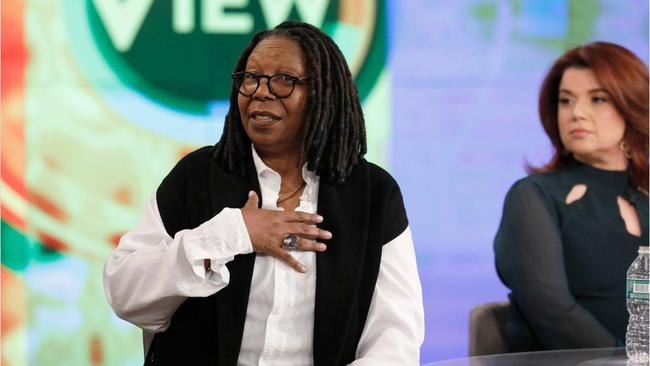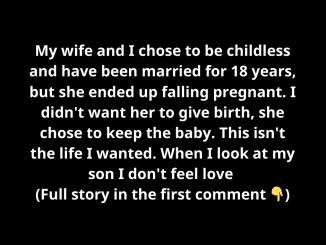“The View” has always been a platform for spirited debates, and Monday’s episode was no exception. Co-hosts Whoopi Goldberg and Ana Navarro found themselves at odds over a highly charged discussion regarding Donald Trump’s possible return to the Oval Office. The fiery exchange, fueled by concerns about what this could mean for vulnerable communities, brought a mix of heated emotions, differing perspectives, and a clear divide on whether it’s time to panic—or prepare.

Goldberg’s Call for Calm: “Don’t Buy Into the Panic”
Whoopi Goldberg, known for her no-nonsense takes, set the tone by urging viewers to focus on the present and avoid unnecessary panic during the holidays. Her message? Don’t let Trump’s political theatrics overshadow precious time with family.
“Listen, he makes lots and lots of noise,” Goldberg began, pointing out Trump’s penchant for grandiose statements and actions designed to stir fear. “All we have to do from now until January 21st is be with our families… Whatever he’s going to do, he’s going to do.”
Goldberg argued that staying in a constant state of worry only serves to play into Trump’s hands, emphasizing that the best course of action is to remain grounded and conserve energy for the battles ahead.
Navarro Pushes Back: “It’s a Privileged Position to Stay Calm”
Ana Navarro, however, was quick to counter, highlighting that not everyone has the luxury of waiting things out. As an outspoken anti-Trump Republican strategist, Navarro took issue with Goldberg’s call for calm, asserting that many Americans don’t have the privilege to relax when their lives, jobs, and rights are on the line.
“We have the luxury of saying that because we’re legal. We are successful,” Navarro argued. “If you are an illegal immigrant in this country, you’re not going to be not in a panic… If you are a woman working for the Department of Defense, you have a right to be in a panic!”
Navarro’s comments reflected the concerns of those who may face immediate repercussions under a Trump administration, including marginalized communities, federal employees, and others whose livelihoods could be threatened.

A Clash of Perspectives: Prepare or Relax?
The argument quickly escalated into a back-and-forth exchange, with Goldberg maintaining that people should avoid unnecessary stress until specific challenges arise. “They’re throwing 50,000 things at you to make you do this,” she said, gesturing to mimic panicked behavior. “I’m saying don’t buy into that.”
Navarro, however, argued that preparation is key, especially for those who feel directly targeted by Trump’s policies. “I’m telling people to prepare,” Navarro shot back, emphasizing the importance of vigilance over complacency.
Goldberg retorted that many individuals are already prepared, stating, “Do you think they aren’t prepared? They are prepared!” The two co-hosts clashed over whether the current moment calls for collective anxiety or a more measured approach.
The Privilege Factor: Navigating Different Realities
One of the most striking aspects of the debate was Navarro’s assertion that Goldberg and others on the panel, by virtue of their fame, legal status, and financial security, might not fully grasp the urgency felt by those at greater risk. “We’re in a privileged position that a lot of people who are going to be under his attack are not,” she said.
Goldberg, on the other hand, expressed frustration with what she perceived as a narrative of fear. Her argument centered on the idea that panic could be counterproductive, draining energy that could be better used for focused action once the true scope of the challenge is clear.

The Broader Implications: Trump’s Polarizing Impact
This exchange highlights the broader tension in American society over how to approach Trump’s political resurgence. For some, his rhetoric and policies represent an existential threat, particularly for marginalized communities and those working in sectors vulnerable to political shifts. For others, Trump’s unpredictability is seen as more of a political spectacle than an immediate crisis, requiring a strategic, rather than emotional, response.
Goldberg’s stance reflects the belief that succumbing to panic can lead to burnout and disillusionment, while Navarro’s perspective underscores the necessity of constant vigilance in the face of potential harm.
When Preparation Meets Pragmatism
Ultimately, the debate boils down to the balance between staying calm and staying prepared. For those who see Trump’s return as a direct threat, Navarro’s call to action resonates deeply. Meanwhile, Goldberg’s emphasis on prioritizing family and mental well-being offers a reminder that self-care is also a form of resistance.
This divide is reflective of a larger conversation in the U.S. about how to approach politically charged moments: with urgency, caution, or a mix of both.
Conclusion: A Heated Debate with No Easy Answers
The exchange between Ana Navarro and Whoopi Goldberg on “The View” underscores the complexity of navigating political uncertainty in a polarized society. Whether you align with Goldberg’s call for calm or Navarro’s push for preparedness, one thing is clear: the conversation about Trump’s potential return to power is far from over. As tensions rise and opinions clash, the debate serves as a reminder of the diverse perspectives that shape the national dialogue—and the importance of finding common ground in the face of division.


